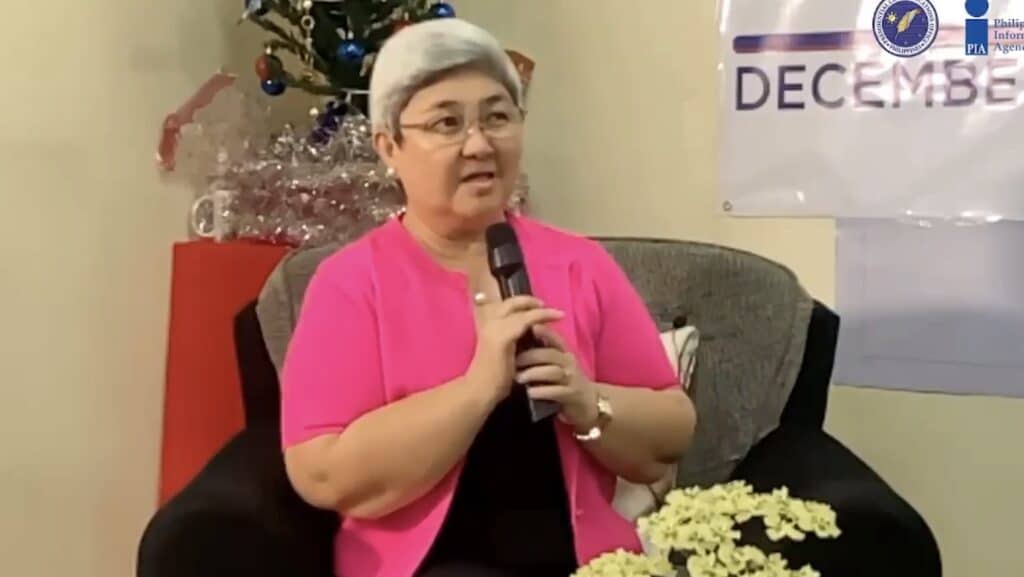
CDA-7 Director Cristina Villamil shares updates of CDA during PIA’s Kapihan episode. | Screengrab from PIA
CEBU CITY, Philippines — The Cooperative Development Authority (CDA) Central Visayas hopes that more young people will join cooperatives.
Cristina Villamil, regional director of CDA-7, said in a news forum of the Philippine Information Agency here that young people must learn the habit of saving.
Villamil said that saving money through cooperatives is beneficial because they do not just get a small cash interest like when they save in a bank, they also get the interest and the patronage refund.
READ MORE: 5 tips on how to celebrate Christmas on a budget
Aside from that, they can also avail themselves of their loan services.
The Philippine Cooperative Code of 2008 does not specifically mention the age requirement for membership in a cooperative.
However, Chapter III Article 26 states that cooperatives organized by minors are considered laboratory cooperatives and must be affiliated with a registered cooperative governed by special guidelines promulgated by the CDA.
The Cooperative Code generally states that cooperatives in the Philippines are open to Filipinos, and their membership conditions are stated according to the cooperative’s bylaws.
What to do when joining a cooperative
Before registering for membership in a cooperative, one should attend a pre-membership education seminar (PEMS). This seminar teaches about the cooperative and its principles.
Villamil said it is one way to determine whether a cooperative is a good choice for you.
Another thing to note is to get recommendations from trusted friends or people and know the cooperative’s reputation.
Villamil said that knowing a cooperative’s reputation is crucial to avoid risking unsafe ones.
Report complaints to CDA
Members with problems or issues with their cooperatives that were not addressed can send their complaints to the CDA, which will assist them.
Villamil said the CDA will have 15 days to respond to the complaints.
In the bylaws of the cooperative, they have their mediation and reconciliation committee, Villamil said.
When CDA receives the complaint, they will determine the appropriate person to settle it.
“If there is a complaint where a member was not given an interest on the capital, we will give it back to the manager or to the board of directors of the cooperative for them to take care… we will give ten to fifteen days to respond,” Villamil said.
Budget hike proposed for CDA
On October 16, the Bureau of Internal Revenue (BIR), in cooperation with the CDA, organized a Tax Forum in Cebu City. Senator Imee Marcos and the members of various cooperatives in Central Visayas attended.
Marcos mentioned that there is a need to help cooperatives “become more resilient and flexible in times of crisis.”
On November 19, Marcos proposed increasing CDA’s 2025 budget by P300 million.
According to information on the Senate’s official site, Marcos said the CDA’s proposed budget for next year was P889.424 million, lower than its 2024 budget of P1.335 billion, under the National Expenditure Program.
“The House of Representatives in the General Appropriations Bill proposed no changes in the CDA’s budget. On the other hand, given the food and agricultural crises today as well as our issues with the PUV modernization, it is our proposal that the Senate partially restored last year’s budget by P300-million at least, resulting in a proposed budget of P1.189-billion,” Marcos said during the budget deliberations on November 19.
She added that the additional P300 million will provide financial assistance to agricultural and food cooperatives, particularly in the micro sector, and prioritize the transport cooperatives being organized for the PUV modernization program.
Villamil said Region 7 currently has around 1,300 cooperatives, but about 700 are “operating co-ops,” or the cooperatives that regularly submit their mandatory yearly reports.
The reports contain the financial statements, a list of training they are supposed to have among their officers for their development, and other necessary reports.
According to CDA, there are 20,752 cooperatives nationwide, including agriculture cooperatives, human services, public utilities, finance, education, advocacy, and union cooperatives, and consumers, marketing, producers, and logistics cooperatives.